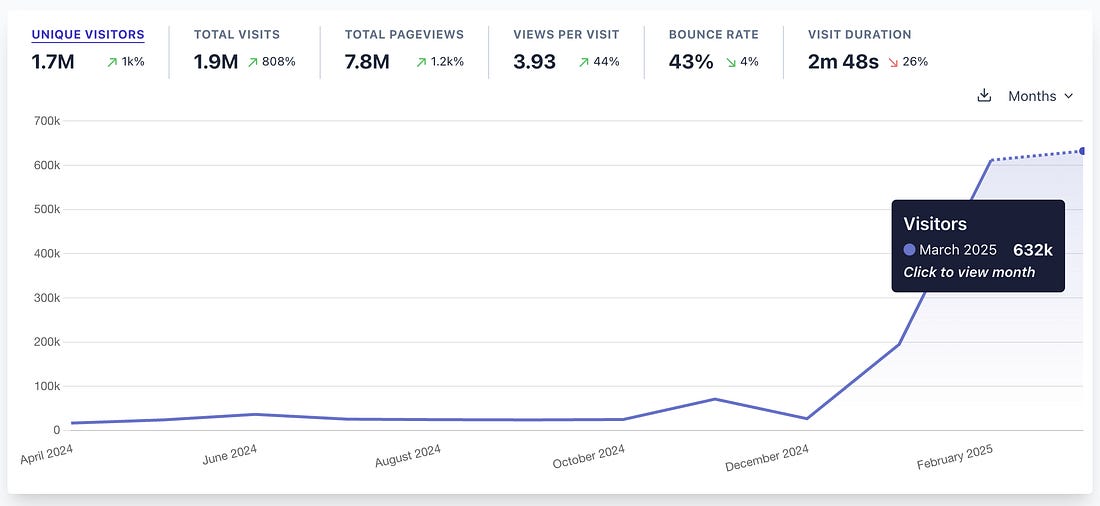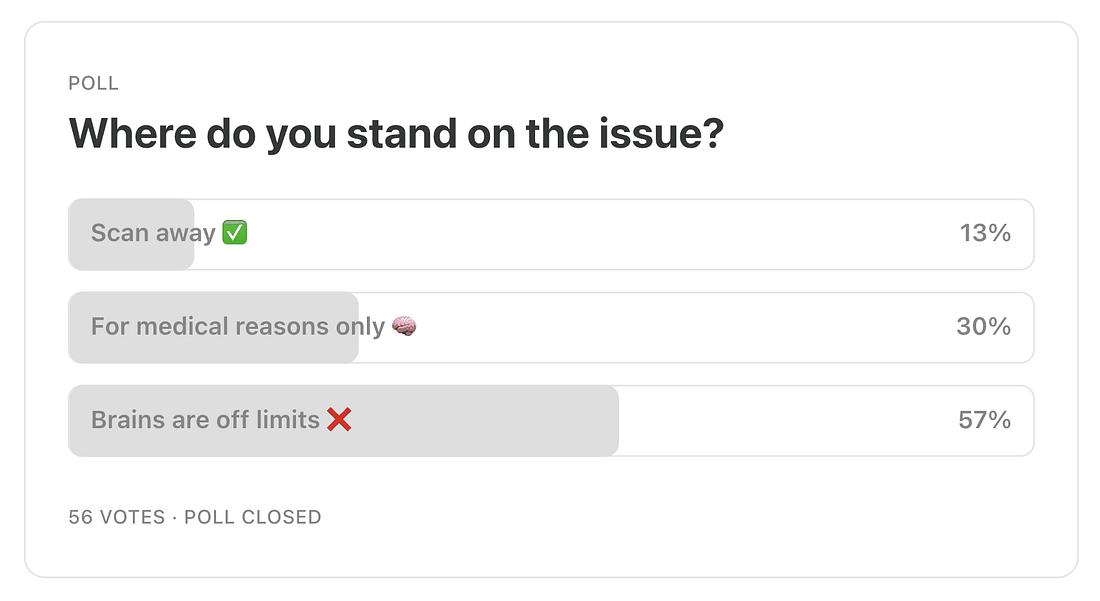Issue 166🔬💡 Meet Evo 2: Biology's Game-Changing DNA Writer. The Hottest New Programming Language is...English? Scientists Create Sound That Curves Through Space to Reach Just One Person.Hey there Bizarro readers! We are back for another month of strange-but-true stories that also happen to be strange-and-very-cool. As usual, you’ll also find some useful tools, mixed with statistics, and more. I won’t keep you waiting any longer. Here are the top stories:
Thanks for being here. We appreciate you. 📰 From the Newsroom🔬💡 Meet Evo 2: Biology's Game-Changing DNA WriterThe Arc Institute just released an AI that can both read and generate DNA sequences like ChatGPT creates text. Evo 2 represents a major leap forward in the emerging field of "generative biology," with the potential to transform everything from genetic disease diagnosis to creating entirely new life forms.
Looking ahead, researchers see this technology advancing just like language AI, with more data, more computing power, and bigger models leading to dramatic improvements. By 2040, your doctor might use an advanced version of this AI to scan your genome, spot disease risks hidden in your DNA, and design personalized treatments. And unlike most AI advancements, Arc Institute has open-sourced this technology, making it freely available to researchers worldwide. 🧠💻 The Hottest New Programming Language is…English?Everyone in tech circles is talking about it - coding without actually writing code. This trendy approach called "vibe coding" is transforming how software gets made, letting people who've never touched a programming language build working applications.
Despite its growing popularity, the vibe coding trend hasn’t been warmly embraced by everyone. Critics have pointed out several major issues with the practice. Still, there’s no denying that software engineering is in the midst of a major shift and will likely look very different in the near future.
🔉🗣️ Scientists Create Sound That Curves Through Space to Reach Just One PersonPenn State researchers have recently figured out how to create "audio enclaves" - little pockets of sound that only you can hear. This breakthrough could change how we experience audio in public spaces forever.
This tech isn't hitting store shelves tomorrow (there are still hurdles with sound quality and power efficiency), but the possibilities are mind-blowing. Imagine museums where each visitor hears their own audio guide without headphones, car passengers enjoying different music without distracting the driver, or having private conversations in crowded places. By rethinking how sound moves through space, these researchers have opened the door to totally new ways to experience audio. Note: Original research paper is here if you’re interested. ⛓️ Ten Must See Links of the MonthSponsored by Optimole, the best image optimization tool on the internet.
🎤 It’s How They Said It“If we continue outsourcing all of our digital infrastructure to billionaires that would rather escape Earth by building space rockets, there will be no Dutch expertise left.” – Dutch MP Barbara Kathmann, author of four (out of eight in total) motions that were submitted and passed by the Netherlands' House of Representatives, calling on the Dutch government to replace software and hardware made by US tech companies with Dutch alternatives. 🧮 The Numbers Game
⚒️ Tools and ResourcesRepomix: This tool bundles your code into formats that AI systems can easily process. It respects your Reveal.js: This is a free, open-source HTML presentation tool that works in any web browser. Built on web technologies, it lets you customize slides with CSS, embed external content, or add custom JavaScript behaviors. The framework includes essential features like nested slides, Markdown support, animations, PDF export, presenter notes, LaTeX capabilities, and code highlighting. DOCX: This JavaScript/TypeScript toolkit makes creating Word documents a breeze - whether you're coding for Node.js or browsers. With its clean API and complete test coverage, you'll spend less time figuring out documentation and more time getting work done. After a quick npm install, you can build documents using intuitive building blocks. 🖼️ What Am I Looking At?This is obviously a chart. To be more specific, it’s a chart showing website traffic to European Alternatives - a website devoted to showcasing European alternatives for digital service and products, like cloud services and SaaS products. It has also very visibly skyrocketed. After hovering below 100,000 visitors for most of 2024, numbers shot up to 750,000 by the end of March 2025, marking a staggering increase since mid-January. This surge coincides with growing European concerns about over-reliance on US cloud giants Google, Microsoft, and Amazon. European officials have started pushing for tech sovereignty and businesses have seen a massive increase in demand across the continent - a sign of the growing rift between the transatlantic partners. 💬 What’s the Word?横飯 (Yoko meshi) is a Japanese expression that literally translates to "sideways rice" but refers to the stress or anxiety experienced when speaking a foreign language. Yoko meshi can happen during those first few weeks with a new programming language. Your brain feels twisted as you try to express familiar concepts using unfamiliar syntax. Even simple tasks become mentally draining as you constantly translate between what you know and this new way of thinking. But hang in there - this mental workout eventually builds new neural pathways, and what once felt like eating rice sideways will soon become second nature. 😉 📊 Results of Last Month’s PollsIt seems that the majority of you are strictly against peeking into human brains - regardless of the underlying reasons. This seems reasonable, given that we all know how the slippery slope of science and technology works. It may start out as benevolent, but in a few years mission statements and terms of service agreements will quietly change and you know the rest… 🧑🏻💻👨🏽💻👩🏼💻 Pledge Your SupportWe recently turned on the pledges ask in Substack. Here’s why: Bizarro Devs has been a free publication for 165 issues, but none of those issues have been free to produce. As a company, we have absorbed the cost because we wanted to give back to the developer community that we are also a part of. Unfortunately, Google’s algorithm changes in the past year have put a significant dent in our revenue, which has made it more challenging to continue operating “as is.” There is a very real possibility that we will no longer be able to sustain the publication of Bizarro Devs on our own past the summer. We turned on the pledges to see if our community here would be willing to help us keep the newsletter alive. Regardless of the response, we don’t plan on immediately converting the newsletter into a paid publication, but the next two or three months will determine how we chart our course and the pledges will play a role in that. Thanks for considering, and as always, thank you reading! If this is the first time you're here at Bizarro Devs and you enjoyed the content, then sign up here to join us on the first Tuesday of every month. Until we see each other again, Bizarro Devs is free today. But if you enjoyed this post, you can tell Bizarro Devs that their writing is valuable by pledging a future subscription. You won't be charged unless they enable payments. |
Selasa, 01 April 2025
Home » » Issue 166
Issue 166
Sharva B | Selasa, 01 April 2025


Tidak ada komentar:
Posting Komentar